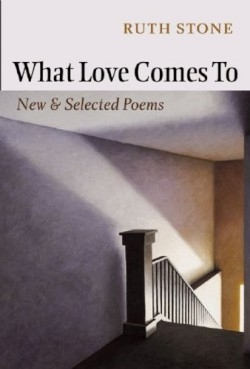What Love Comes To
New & Selected Poems
Ruth Stone, born in Virginia in 1915, has published thirteen collections of poems. Winner of the National Book Award, the Wallace Stevens Award, the National Book Critics Circle Award, a Whiting Award, and two Guggenheim Fellowships, she now lives in Vermont and has been poet laureate of that state.
“I decided very early not to write like other people,” Stone has said. What Love Comes To: New & Selected Poems offers evidence, as well as a chance at last—guided by poet Sharon Olds’ personal and perceptive introduction—to spread out the map to see where the entire career, the life, has traveled. Selections from Stone’s first book, In An Iridescent Time (1959), published after her husband’s suicide that year, begin her many poems of loss, some of the most astute and passionate in our language. The poems gather pain into the plainest of lines. The poem, “Loss,” from Cheap: New Poems & Ballads ends:
It all remained the same.
It was not even a painting.
It was objects in space without any aura. No meaning attached.
Their very existence was a burden to me.
And I would go back to my bed whimpering.
The numbered sequence from Who Is the Widow’s Muse (1991), nineteen sections of which are included in this selection, is a gorgeous depiction of the evolution of sorrow, each jewel-sharp, containing not a grain of self-pity. Stone continues to locate a universal human longing in her particular loss, but it would be a mistake to think of her as a sad poet. “See what you miss by being dead?” she ends one poem. Her sense of humor, as well as her subjects, range from planning an entire life out of the indications of a glass of iced ginger ale (“How to Catch Aunt Harriet”), to life studies such as “Certainly Not,” about a fat man across the bus seat, and “The Sun With Mr. Parker’s Help,” about the cleaning man in a large apartment building. Stone is seldom political, but her poems are sharply ironic. “Sin,” about a Harvard student who couldn’t admit he’s gay, ends with “And speaking of real sin, / we had just dropped / that bomb on Japan.”
Stone has said she loved fairy tales as a child. Indeed, there is a fairy-tale, a child’s voice, in even the most wry and mature poems, and it is that quality that carries so much clarity, strangeness, and energy. The lines are seldom enjambed; there is no obvious effort to be metaphorical. The poems present what they present; the accumulation of them becomes one voice that is its own passionate meaning.
Reviewed by
Fleda Brown
Disclosure: This article is not an endorsement, but a review. The publisher of this book provided free copies of the book to have their book reviewed by a professional reviewer. No fee was paid by the publisher for this review. Foreword Reviews only recommends books that we love. Foreword Magazine, Inc. is disclosing this in accordance with the Federal Trade Commission’s 16 CFR, Part 255.

